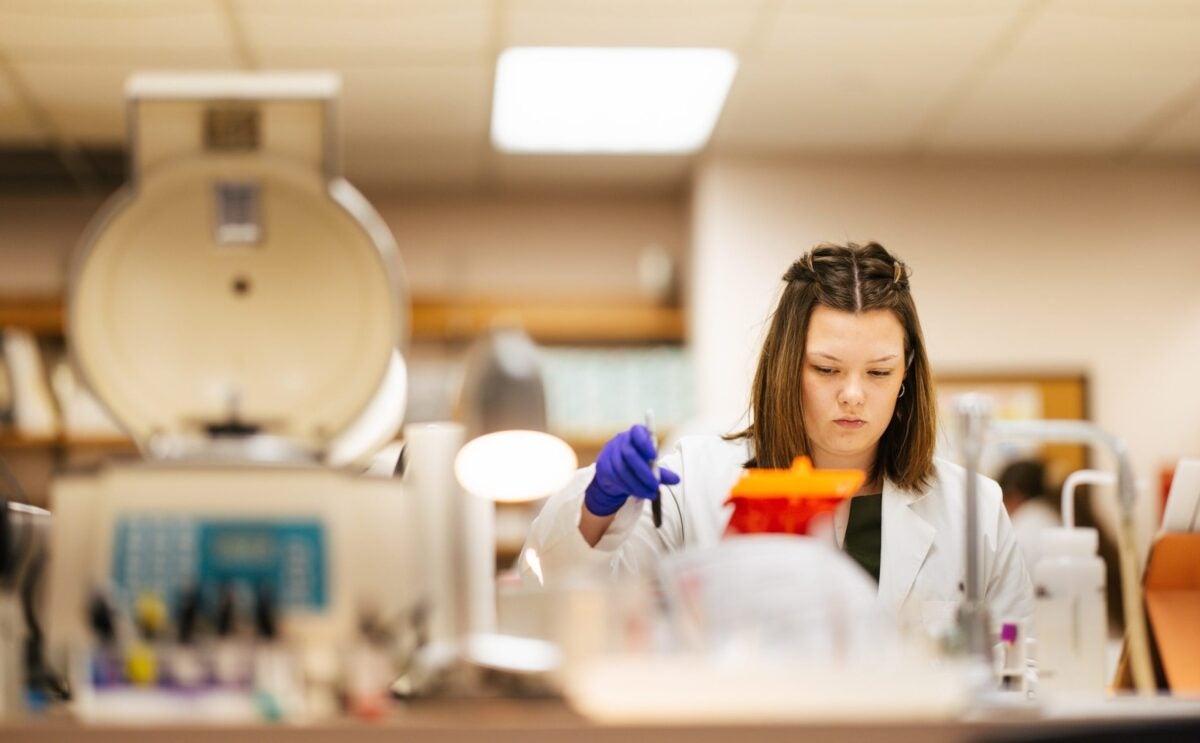
Clinical Laboratory Science

Our Program
The Clinical Laboratory Sciences (CLS) Department provides two distinct degree programs: the Associate in Applied Science in Medical Laboratory Technology (AAS-MLT) and the Bachelor of Science in Medical Laboratory Science (BS-MLS).
These programs are structured as an integrated “2+2” ladder curriculum, allowing students to first complete the AAS-MLT at Marshall University or another institution, and then continue to earn a BS-MLS. All courses in the BS-MLS program are available 100% online.
Both the AAS-MLT and BS-MLS degree programs are recognized as STEM programs by the U.S. Department of Homeland Security (DHS), emphasizing their focus on Science, Technology, Engineering, and Mathematics. Students can choose to complete the AAS-MLT or pursue both degrees for enhanced career opportunities in medical laboratory science.
Program Mission Statement
The mission of the Clinical Laboratory Sciences Department is to provide competent laboratory professionals who are qualified to staff healthcare facilities and, thus, furnish the highest quality of patient care to our servicing area. The primary area serviced with our graduates is the Huntington Tri-State area and other underserved areas of West Virginia, Ohio, and Kentucky. These clinical laboratory professionals provide the highest quality laboratory test results that provide 70-80% of the objective data needed for physicians to make accurate patient diagnosis. The Clinical Laboratory Sciences Department provides continuing clinical medical education for the region as required by professional organizations and healthcare facilities. In addition, it is an ongoing mission of the department to implement innovative programs to meet the dynamic needs of the medical community.
Career Opportunities
Medical laboratory scientists are often employed in hospital laboratories, while others find employment in physician’s offices, the armed forces, and state and federal health agencies.
According to the U.S. Bureau of Labor and Statistics, the median pay for clinical laboratory technologists and technicians in 2023 was $60,780. The job outlook for this career is projected to be 5%, which is about the fast as the national average for all careers.
Graduates have continued their education to become physicians, dentists, physical therapists, health informatics specialists, hospital administrators, pharmaceutical salespersons, college professors, biomedical researchers, physician’s assistants, attorneys and scientific device reviewers.
- Clinical chemistry technologist
- Clinical laboratory technologist
- Hematology technologist
- Laboratory manager
- Medical laboratory scientist
- Quality control analyst
Request Info
- Find out which of our academic programs is right for you.
- Meet some of our current students and hear about their favorite Marshall moments.
- Receive invitations to special events for future students.
- Get help with the application and enrollment process.
Program Accreditation
Our MLT and MLS programs are both nationally accredited by National Accrediting Agency for Clinical Laboratory Sciences (NAACLS), which can be reached by the following contact information:
National Accrediting Agency for Clinical Laboratory Sciences (NAACLS)
5600 N. River Road Suite 720
Rosemont, IL 60018-5119
Telephone: 847.939.3597 or 773.714.8880
Fax: 773.714.8886
http://www.naacls.org
Program Outcomes
Program Goals & Graduation Competencies
Goals upon graduation from the Medical Laboratory Technology or Medical Laboratory Science program are:
- Prepare graduates with attitudes, knowledge, and skills that prepare them for entry into the clinical laboratory workforce as Medical Laboratory Technicians (MLT) or Medical Laboratory Scientists (MLS).
- Prepare graduates to continue learning advanced knowledge about human health and disease.
- Prepare graduates with knowledge and experience necessary for national certification as a Medical Laboratory Technician (MLT) or Medical Laboratory Scientist (MLS).
- Students show demonstration of minimum levels or proficient performance and knowledge of each clinical specialty studied in the pre-clinical portions of the program, including advanced clinical hematology, clinical chemistry, clinical immunohematology and clinical microbiology as well as laboratory instrumentation and laboratory supervision.
Students from the CLS programs have a 100% employment rate within six months of graduation and are able to earn a good salary.
